Notes on the Collection of Folk Songs by the "Leader and Moderator" of China Folk Song Conference
CCTV News:China Folk Song Conference takes the regional coordinates of the Yellow River, the frontier, the Yangtze River and the coastal areas as the main line, and gathers experts, scholars, inheritors and singers from 34 provinces, municipalities and autonomous regions to unfold a China folk song map integrating regional characteristics and competitive performances for the audience. The program designed eight programs with four themes, namely, "the river comes from the sky", "Long song travels all the way", "drinking a river together" and "homesickness in the sea".
During the recording of the program, all the hosts of the variety channel personally led the team to travel across mountains and rivers, and went deep into the gathering places of ethnic minorities all over the country to find original folk songs and singers for interviews and exchanges, leading the audience to experience the folk song landscapes around the country and at the same time reflecting the landscapes of different regions. In the program, the audience can not only hear many popular folk songs, but also deeply and thoroughly understand the roots of these folk songs and the background stories they contain, so as to explore the spiritual and cultural traditions of their ethnic groups and regions from a small perspective. Such a "grounded gas" experience of collecting wind makes the hosts unforgettable. The following are the notes of the "leader and moderator" — —
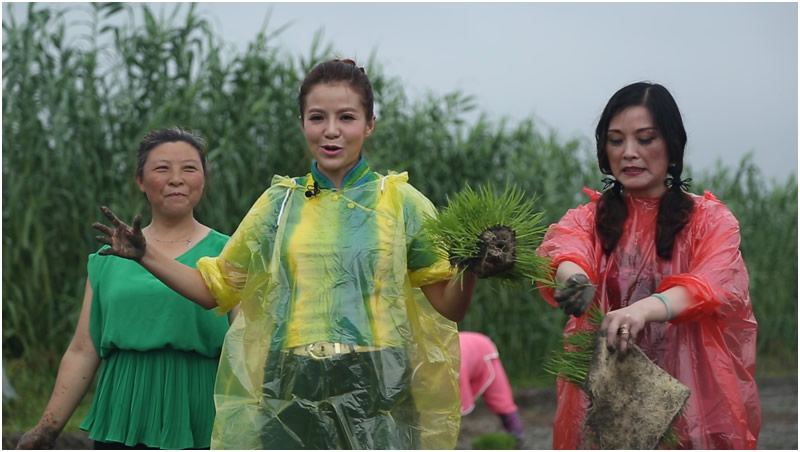
Zhu Xun: Find the voice that has been in the blood for a long time.
This time, I went to my hometown of Jiangsu, and this experience gave me a new understanding of folk songs. Compared with Xizang, Inner Mongolia, Xinjiang and other northwest regions, the folk songs in the south of the Yangtze River are relatively graceful, but they show a different vigor.
In Shaobo Town, the "hometown of folk music" in Yangzhou, Jiangsu Province, I found the local classic labor folk song "Rooted Luchai Flower" and its inheritor Wang Ruiru. Although it is the first time to listen to it, there is a feeling of deja vu. Perhaps this is the sound of dust in my blood! "Pulling out the Roots of Lu Chai Hua" is a widely sung paddy field song, which was sung when farmers were transplanting rice seedlings, and it has a strong Shan Ye flavor. In order to feel the artistic conception of this folk song more deeply, I also threw trouser legs into the water to transplant rice seedlings! Don’t underestimate transplanting rice seedlings. It’s really a technical job. I can’t stand or squat. I can only bow my waist and pout my ass and slowly insert it backwards. Not only that, I also personally touched the wealth belonging to mankind — — Organic fertilizer really feels the hard work of a handful of working people!
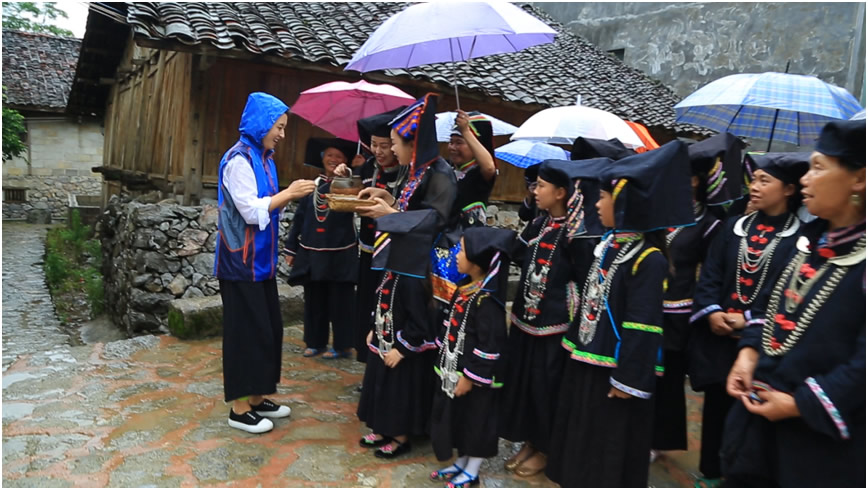
Lei Zhang: There is a distant concern in my heart.
This time, in addition to returning to my hometown of Shanxi to look for Peach Blossoms, Red Apricots and White Flowers, I also went to another place I was not familiar with before — — In the black Zhuang area of Napo County, Guangxi, I not only found the classic folk song "Folk Songs are Like Spring River Water" and its predecessor "Pomegranate Green", but also gained a warm memory.
Speaking of this trip, it is no exaggeration to describe it as "both wind and rain". Because the destination is remote, the program group can only get off the plane in Nanning and then drive to Napo County overnight. The mountain road is rugged, and the road is long, so each of us is staring at the night road with an extremely strong spirit. After arriving in Napo county, we took the mountain road to the place where the black Zhuang people lived in compact communities. The weather in the mountains is uncertain, and the heavy rain is urgent, so it will rain as soon as you say it. However, only two female colleagues in the team brought two sun umbrellas, and all of them contributed to protect the camera from the rain. So, we were all drenched by the heavy rain!
Seeing this, the Zhuang villagers waiting to receive us at the destination quickly made a brazier to warm the working group. The brazier is very small, obviously it can’t meet the needs of so many of us, and I also wear jeans. Because the material is very thick and not easy to dry, it has been wet and stuck to my body, making me tremble with cold. Among the villagers sitting around the brazier, an aunt didn’t talk much, but looked silly. Seeing that I was shivering all the time, she silently returned to the house and took out a dozen specially clean clothes of the Zhuang nationality in black for me to change into. At the moment I received the clothes, my skin that had been eroded by the cold rain seemed to have a temperature in an instant, and a warm current hit my heart. After I put on my aunt’s loving clothes, I felt a kind of dryness that I had never seen before! This time, my aunt specially asked someone to bring me that suit. It is this incident that makes me feel that there is another person in the world who can make me care.
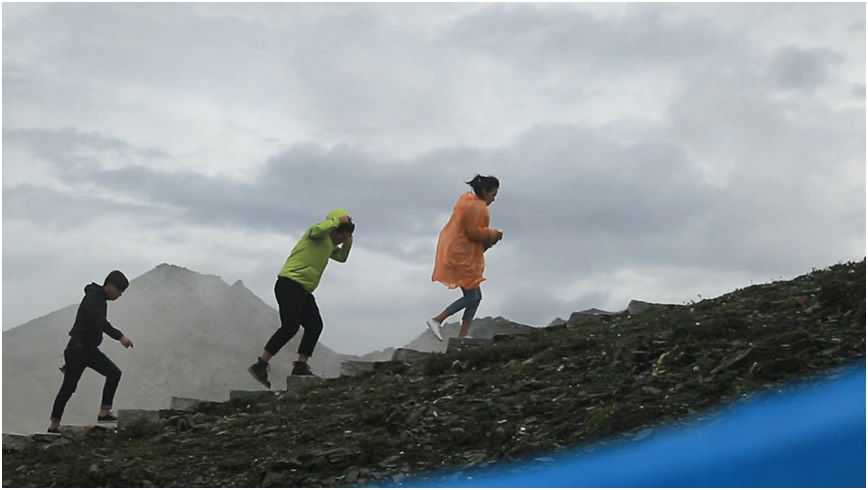
Guan Tong: Isn’t it just mountain climbing? Piece of cake!
"Kangding Love Song" should be regarded as a classic folk song that everyone is familiar with! When I went to its birthplace this time, I felt from the bottom of my heart that I had been in touch with this land at an altitude of more than 4000 meters for a long time. Looking at the four characters of "Kangding Love Song" on the high slope, and then looking up at the blue sky and white clouds, it is really refreshing. Isn’t it a pity that there is no unforgettable memory in such a beautiful place?
Before we set out for the tour, the program group knew that I was not good at sports and my physical strength was not strong, and even dared not tell me that I would climb the mountain this time! When they successfully tricked me into the foot of the mountain, looking at everything in front of me, I really couldn’t say how bitter it was! The team’s friends also squeezed a sweat for me. Originally, I thought this trip was equivalent to a cultural tour. However, the ideal is full and the reality is very skinny. Facing the mountain in front of me, I still have to complete this task ~ ~
What I want to say especially about this mountain climbing is: I think my performance this time is really great! Completely out of my expectation! In the process of climbing the mountain, I not only insisted on setting an example, but always led the team at the forefront, encouraging everyone to go forward bravely, and the original three-hour climb was completed in only two hours. This sudden sense of accomplishment has excited me for a long time … …
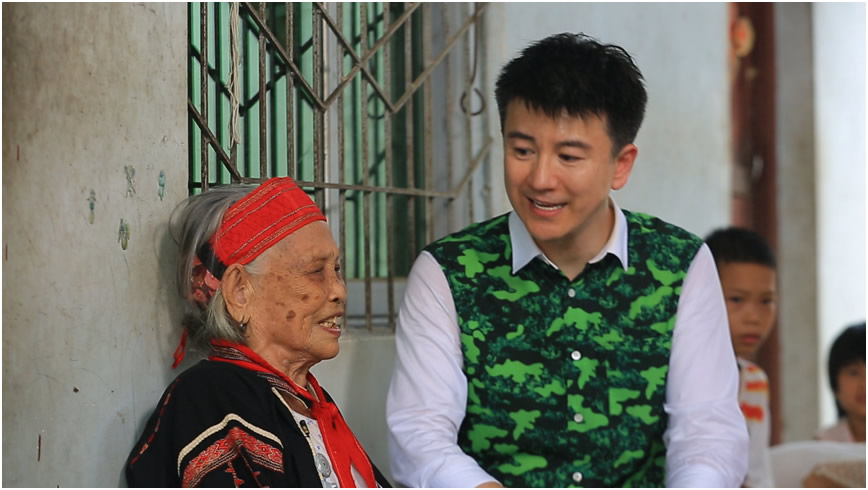
Ma Yue: The hot and cold poles are exciting enough.
The two places that impressed me deeply this time were Xizang and Sanya.
This is my sixth visit to Tibet. I have never experienced altitude sickness before, but this time it is particularly strong, which is a different memory of my visit to Tibet! In the process of searching for folk songs, after we got on the train from Lhasa, we met a group of local high school students in the carriage. Everyone sang happily together and the atmosphere was very warm.
Speaking of Sanya, my team and I went to Wanquan River. After more than an hour’s trek, we found the village where folk songs originated and a 95-year-old grandmother. This old woman once lived and fought with the Red Army, sang and arranged songs with the Red Army. Grandma also sang a song "Luo Nidiao" for everyone. "Luo Nidiao" sounds unfamiliar, but it has a lot of origins! After grandma’s detailed introduction, we realized that Wanquan River is Clear and Clear, which is familiar to everyone now, was first adapted from "Luo Nidiao" to "Wuzhishan Song", and then it was adapted to a certain extent before it evolved into what Wanquan River is now ~
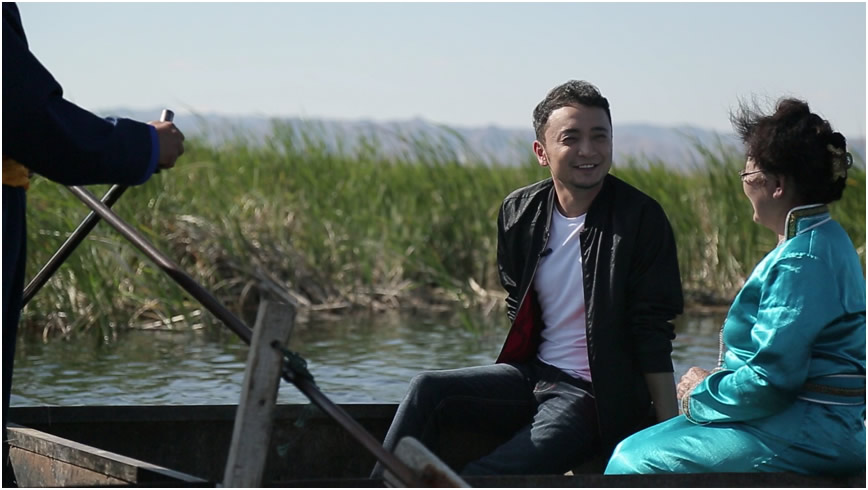
Xiao Ni: Do you believe me when I said I was boating in Inner Mongolia?
Xiao Ni also went to many places this time. What impressed me the most was Wulate Zhongqi in Inner Mongolia, which was the birthplace of the Inner Mongolia folk song Hongyan, and its predecessor was a song called Honggaru. There are two legends about Honggaru. One is that it is a Urad toast song, which is usually sung by young people to their parents and lovers on the eve of the war. Second, it refers to a sad love story, in which the protagonist Honggaru and her beloved young man died in the battlefield to defend their country.
In fact, I wanted to play in Inner Mongolia a long time ago! This is such a good opportunity, not only to listen to songs, but also to make friends and travel, so don’t miss it! So in the process of collecting wind, I properly enjoyed the beautiful scenery of Urad. Would you believe me if I said I was boating in the Inner Mongolia prairie? — — You see what I said is so sincere, of course it’s true! I took a boat on the beautiful shepherd sea in Urad, and felt the ripples of reeds in the lake, the breeze across my face, and the silence that the city didn’t have. It was very comfortable. Really recommend Urad, a beautiful and magical place to our friends, and feel this pure land together!
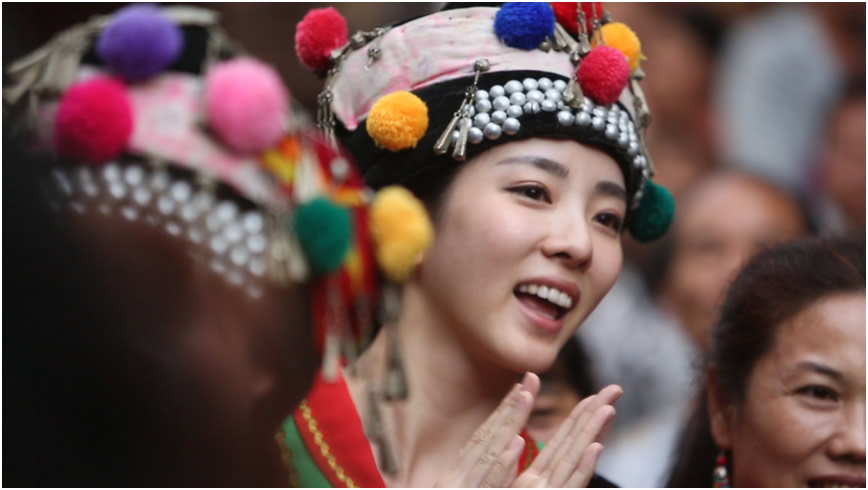
Li Sisi: Nature is the best listener of folk songs.
With the task, I went to Wuliangshan, Yunnan Province to find traces of "Yi people playing songs" and "Haicaiqiang", and I also found Gao Hongzhang, a vegetable dancer who just met at the Spring Festival Evening not long ago.
In the process of collecting wind, I saw villages surrounded by mountains and rivers, met local warm and simple people, and heard original ecological and grounded folk songs, which deeply touched me. I used to think that folk songs are all from mountains, which is a little far away for me. Through this visit, I found that folk songs are not only sung to the audience, but also to mountains, trees, rivers and nature. Nature’s feedback to folk songs is the most powerful feedback!
Real folk songs can cross the boundaries of time and space, cross the language and reach people’s hearts directly. The "Folk Song Conference" only provides a stage for displaying folk songs of different regions and nationalities, so that we can have the opportunity to hear those voices from the depths of nature.
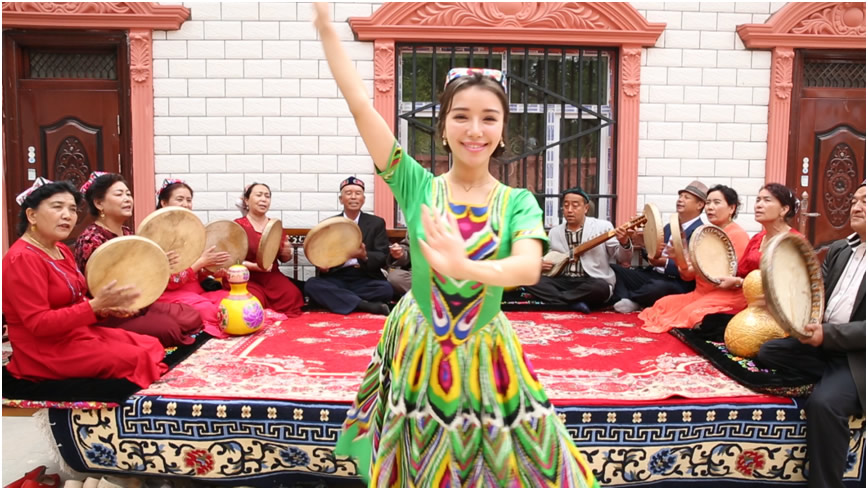
Weinina: I can’t resist the heat wave in Xinjiang!
I happened to go back to my hometown, Xinjiang, by the opportunity of collecting folk songs in China. Although I am a native girl in Xinjiang, I have never been to Hami before, and this tour is also my "first tour in Hami" ~
In Hami, I saw the distinctive ancient Uighur architecture, which I had never seen before in my hometown. I also met a group of beautiful girls and handsome boys. Uyghur people are famous for their hospitality, and I was invited by many people to eat at home and pick grapes! Although we don’t know each other, we can "beat the tambourine and sing songs" together in a second. This heat wave is really irresistible!
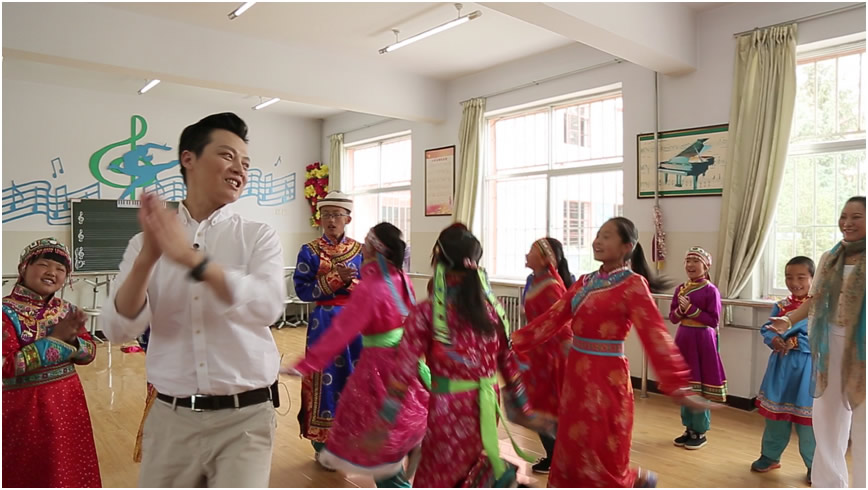
Ren Luyu: Folk songs are the aspiration of the heart that transcends language.
Going to my hometown of Henan to find the almost lost "Nine Lotus Lantern" is not the only destination for me to go to the grass-roots level to collect wind! What impressed me deeply was the trip of folk songs in Sunan Yugur Autonomous County, Gansu Province.
In Sunan, I found the old man Du Shoulan, the inheritor of Yugu folk songs. Although the old man has entered seventy years of age, his spirit is still hale and hearty. Seeing our visit, she enthusiastically sang Yugur folk songs for everyone, probably because of her deep feelings, and the old man could not help crying after singing. The others present were very moved even if they didn’t speak the language.
In my opinion, this is the charm of folk songs, which can cross language barriers, form inner resonance and make people’s hearts move. The culture contained in this folk song is the root of the Yugur nationality and the Chinese nation.
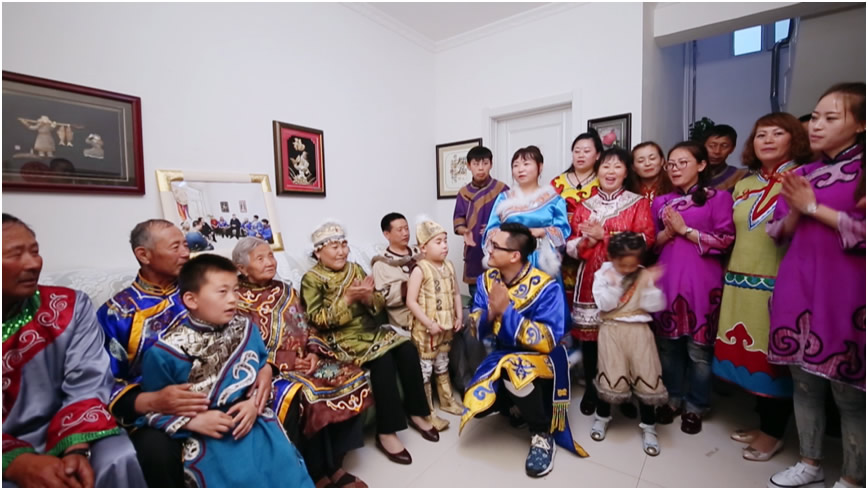
Gong Yan: Don’t forget why you started because you walked too far.
This time I went to Hezhe nationality in Bacha Township, Heilongjiang Province, where I met Sun Zhongkui, a local original ecological singer. Besides listening to his folk songs, I also experienced the pleasure of fishing on the river with him. Sun Zhongkui is engaged in the protection, excavation, arrangement and inheritance of Hezhe national culture. He told me that every year he would find time to go back to the boat to fish. He felt that only by truly living in the primitive lifestyle of Hezhe people can we better explore the cultural roots of Hezhe people.
In the process of exploring folk songs, I also discovered the true meaning of life — — A person, only by remembering the roots of the nation, can find the future direction and the strength to advance, and support us to move forward with determination! This is what I learned from Sun Zhongkui, and also from the whole Hezhe people! Tell the truth, my trip, glad you came!

Zhang Zequn: The inheritance of folk songs never stops.
Guangdong music is a kind of music with distinctive local color and unique style. This time, I led a team to tanzhou town, Guangdong Province to find Guangdong’s classic folk songs — — "salty water song"!
The melody of salty water songs is sometimes passionate and unrestrained, and sometimes it is gentle and tender. In the song, we can feel the happiness of laborers when they work. How can such a wonderful folk song be done without an inheritor? The local villagers said that there is a "Folk Song Primary School" in Dongsheng Town, not far away, where children can sing folk songs, and folk songs have been passed down from generation to generation in this way.
As the source of soil and water vitality, folk songs are taught by teachers to students, and students become teachers, so that the melody of Guangdong folk songs will be passed down from generation to generation. I was deeply impressed by this feeling passed down from generation to generation. I think this is also the reason why the "Salty Water Song" can be preserved to this day!